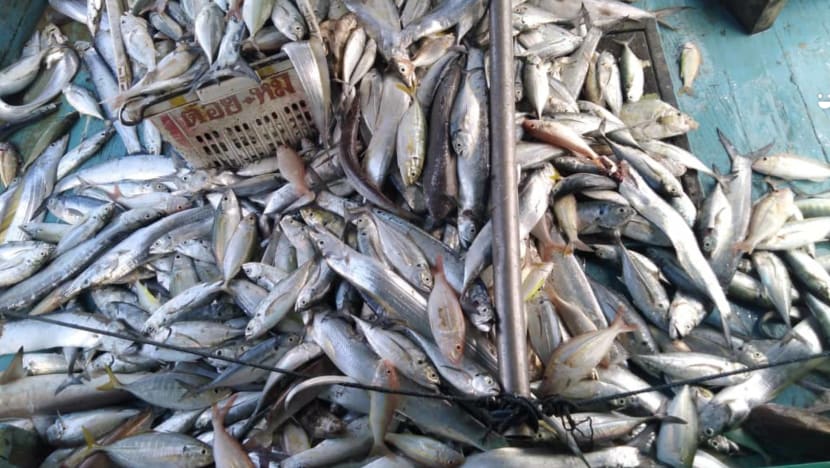As movement curbs persist, Malaysian fishermen and farmers grapple with lower demand and logistics issues

It has become less easy to make a living catching fish, said Rosmadi Ramli, 46, who has just returned from the sea late Thursday (Aug 5) evening with his son.
Sailing out for two days and one night, Mr Rosmadi’s catch comprised many different types of fish.
“What we net, we will try to sell at the market.”
“The only problem is that these days, it’s become much harder to sell our fish to outsiders because of movement restrictions,” Mr Rosmadi, who lives in the fishing village of Setiu, Terengganu, said.
Previously, middlemen and dining establishments in the Klang Valley and other towns would come to make their picks and the fishermen could earn decent income.
These days, the only place to sell is at the local market, leading to an oversupply and consequently, a drop in local market prices for their catch, hurting the income of the fishermen.
Elsewhere, the pandemic has also dealt a blow to vegetable growers, who have to grapple with lower demand as well as disruptions in logistics.
Farmers in Cameron Highlands were earlier hit by movement curbs that prevented them from tending to their farms. Aside from that, they also have to deal with the occasional closure of the wholesale market in the Klang Valley, which is the main distribution centre for their produce.
“OUR INCOME HAS DROPPED SUBSTANTIALLY”
Since Malaysia transitioned into the current National Recovery Plan (NRP) back in mid-June to chart the path towards reopening, a number of states have progressed to the second and third phases of the NRP. Vaccination rate, daily cases and hospital capacity are the thresholds for entering the next phase.
Terengganu is now in the second phase, where restrictions such as a ban on interstate and inter-district movement still apply.
“Compared to before COVID-19 and even when there was the loose recovery MCO last year, our income has dropped substantially,” Mr Rosmadi said. MCO refers to movement control order, the previous lockdown measures.
While one kilogram of ikan kembung (chub mackerel), a staple for many fish-loving Malaysians, could sell for RM10 (US$2.36) or sometimes even slightly higher last time, the price has dropped to RM9 and even RM8 per kg if everyone pulled in a substantial catch, Mr Rosmadi added.
His wife, Zaitol Akmal, noted that the costs for heading out to sea still remained the same when the fish sales dropped.
“The sea is unpredictable. Sometimes, good weather and season, your catch is good, but the price at the market is low now because we don’t have enough buyers.”
“You don’t have the towkays (bosses) coming from Kuala Lumpur or Johor to buy. We also had purchasers from Singapore too,” Mdm Zaitol added.
Other businesses along the fisheries supply chain were also affected, such as Mr Wan Ahmad Khairuddin’s company in Dungun that supplies fibreglass boats and maintenance products for fishing boats.
Part of Dungun, where a fishermen’s enclave is located, has been placed under enhanced MCO (EMCO) since Aug 1 due to a rise in cases. This means no fishermen could leave their residences to head out to catch fish.
“Business has dropped tremendously, because normally my customers are mostly walk-ins and only buy (my products) when they need to head out to the sea.”
“For them it’s even worse, because their livelihood depends on what they can catch, and right now they can’t even go out,” Mr Wan Ahmad, who has been running his business for 11 years, said.
Source: www.channelnewsasia.com
